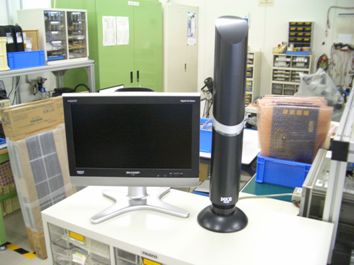May 30, 2009
Researchers' Photovoltaic Power System Requires No DC/AC Conversion
Keywords: Renewable Energy University / Research institute

Copyright Researchers at Tohoku University Dr. Tohji
Researchers at Tohoku University's Graduate School of Environmental Studies announced on December 17, 2008, they have successfully demonstrated that photovoltaic energy generated by a household system can be stored in a lithium battery to then power household appliances without first requiring direct current (DC) electricity to be converted into alternating current (AC). The Energy Conservation Technology Development Project on Storing and Utilizing Electricity from Small Sources for Eco-Houses is funded by Japan's Ministry of the Environment through an initiative to research and develop global warming prevention technologies, and is also supported by various corporations.
With a conventional photovoltaic system, the conversion of electrical current must be done twice before the power can be used in a household. The new system, however, does not require any conversion because the energy goes straight to the battery for storage instead of being converted, resulting in zero electricity loss and much improved energy utilization efficiency. The university hopes to move ahead with developing mechanisms to capture and store small amounts of energy to make a household energy self-sufficient with no carbon dioxide emissions directly related to electricity usage.
The university intends to pursue night utilization of solar-generated energy, improved energy portability, and utilization of unused household electricity and renewable energy. The university also plans to test-launch the new system, which includes the system for storing small amounts of energy, at a model eco-house targeted for completion in March 2010.
Posted: 2009/05/30 06:00:15 AM
Related
"JFS Newsletter"
- 'Yumekaze' Wind Turbine Project Connects Metro Consumers and Regional Producers: Seikatsu Club Consumers' Co-operative
- Shaping Japan's Energy toward 2050 Participating in the Round Table for Studying Energy Situations
- Nishiawakura's Initiative for 100% Energy Self-Sufficiency, and a Municipal ICO Scheme
- Actions Toward 100% Renewable Energy in Japan
- Sustainable Community Building in Shimokawa: Recycling-Oriented Forest Management Enabling Permanent Use of Forest Resources
Related
"Popular Articles"
- Current Status of Renewable Energy in Japan (2015)
- Offshore Wind Farm Withstands Great East Japan Earthquake and Tsunami
- Current Status of Renewable Energy in Japan (2014)
- Geothermal Power: Japan Has World's Third Largest Geothermal Reserves, 60 Percent of Which Can Be Developed
- Tokyo Plans to Increase Renewable Energy Ratio to 20% by 2024


